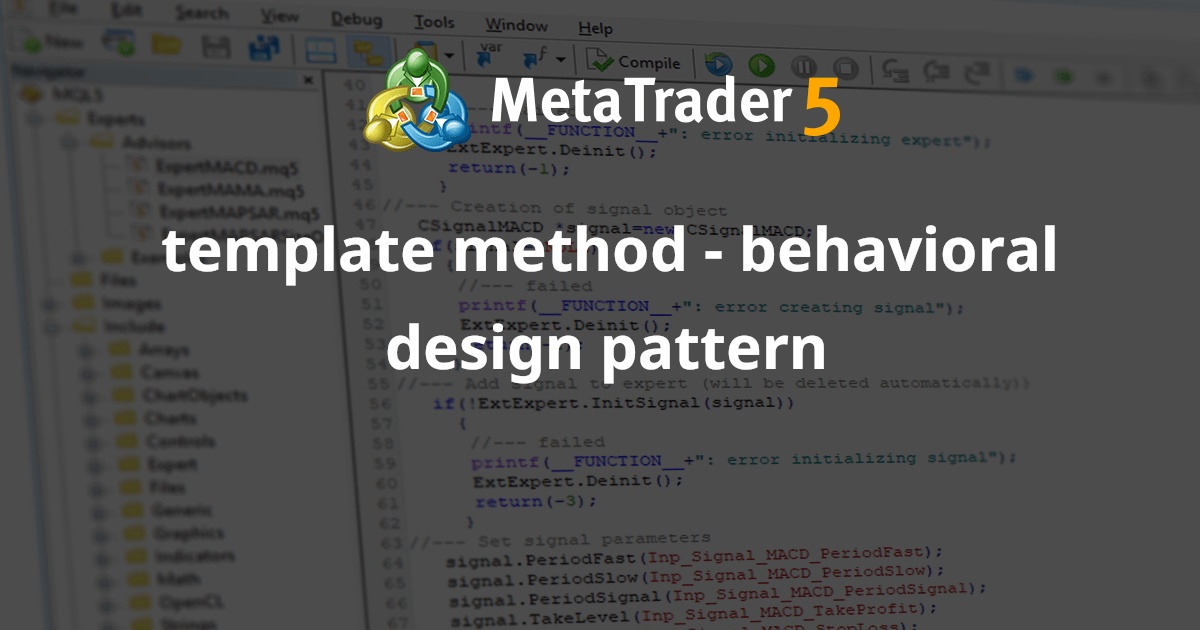
//+------------------------------------------------------------------+ //| TemplateMethod.mq5 | //| 2019-2020, dimitri pecheritsa | //| 792112@gmail.com | //+------------------------------------------------------------------+ // // template method - behavioral design pattern // // from: design patterns: elements of reusable object-oriented software // by gof: erich gamma, richard helm, ralph johnson, john vlissides // published in 1994 // // intent // // define the skeleton of an algorithm in an operation, deferring some //steps to subclasses. template method lets subclasses redefine certain //steps of an algorithm without changing the algorithm's structure // // structure // // | AbstractClass | // |----------------------| // |TemplateMethod() | // | ... | // | PrimitiveOperation1()| // | ... | // | PrimitiveOperation2()| // | ... | // |PrimitiveOperation1() | // |PrimitiveOperation2() | // ^ // | // | ConcreteClass | // |---------------------| // |PrimitiveOperation1()| // |PrimitiveOperation2()| // // applicability // // the template method pattern should be used // to implement the invariant parts of an algorithm once and leave //it up to subclasses to implement the behavior that can vary // when common behavior among subclasses should be factored and //localized in a common class to avoid code duplication. this is a good //example of "refactoring to generalize". you first identify the differences //in the existing code and then separate the differences into new operations. //finally, you replace the differing code with a template method that //calls one of these new operations // to control subclasses extensions. you can define a template method //that calls "hook" operations (see consequences) at specific points, //thereby permitting extensions only at those points // // participants // // abstract class // defines abstract primitive operations that concrete subclasses //define to implement steps of an algorithm // implements a template method defining the skeleton of an algorithm. //the template method calls primitive operations as well as operations //defined in abstract class or those of other objects // concrete class // implements the primitive operations to carry out subclass-specific //steps of the algorithm // // collaborations // // concrete class relies on abstract class to implement the invariant //steps of the algorithm // //+------------------------------------------------------------------+ //| example of a client | //+------------------------------------------------------------------+ #include <Mqh\Patterns\Template Method\AbstractClass.mqh> #include <Mqh\Patterns\Template Method\ConcreteClass.mqh> void OnStart() { AbstractClass* instance=new ConcreteClass(); instance.TemplateMethod(); delete instance; } // // output // // abstract template method requested // executing concrete primitive operation 1 // executing concrete primitive operation 2 // // consequences // // template methods are a fundamental technique for code reuse. they //are particularly important in class libraries, because they are the //means for factoring out common behavior in library classes. // template methods lead to an inverted control structure that's sometimes //referred to as "the hollywood principle," that is, "don't call us, we'll //call you". this refers to how a parent class calls the operations of //a subclass and not the other way around. // template methods call the following kinds of operations: // concrete operations (either on the concrete class or on client //classes); // concrete abstract class operations (i.e., operations that are //generally useful to subclasses); // primitive operations (i.e., abstract operations); // factory methods and // hook operations, which provide default behavior that subclasses //can extend if necessary. a hook operation often does nothing by default // // implementation // // three implementation issues are worth noting: // using c++ access control // in c++, the primitive operations that a template method calls //can be declared protected members. this ensures that they are only called //by the template method. primitive operations that must be overridden //are declared pure virtual. the template method itself should not be //overridden; therefore you can make the template method a nonvirtual //member function. // minimizing primitive operations // an important goal in designing template methods is to minimize //the number of primitive operations that a subclass must override to //flesh out the algorithm. the more operations that need overriding, the //more tedious things get for clients. // naming conventions // you can identify the operations that should be overridden by //adding a prefix to their names. for example, refix template method names //with "do-": "docreatedocument", "doread", and so forth. // // related patterns // // factory methods are often called by template methods // strategy: template methods use inheritance to vary part of an algorithm. //strategies use delegation to vary the entire algorithm // //+------------------------------------------------------------------+















